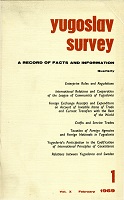
We kindly inform you that, as long as the subject affiliation of our 300.000+ articles is in progress, you might get unsufficient or no results on your third level or second level search. In this case, please broaden your search criteria.

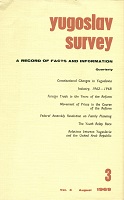
Relations between Yugoslavia and the United Arab Republic have made further, substantial progress in recent years. Cooperation based on the principles of non-alignment, close coordination of efforts, exchanges of experience, and promotion of political, economic, cultural and other relations has been strengthened. Bilateral relations between the two countries have been enriched with new content and a variety of new forms, as can be seen from the numerous visits, personal contacts and exchanges of delegations.
More...
Relations between Yugoslavia and Norway are based on bonds of traditional friendship and mutual respect forged during the Second World War when the Norwegian people lent massive moral and material support to Yugoslav citizens interned in Fascist concentration camps in Norway. These friendly relations have continued and been further deepened since the war. The numerous visits by and contacts between statesmen and representatives of political parties, social and cultural life, have been a vivid expression of the two countries’ wish to expand mutual relations and various forms of cooperation.
More...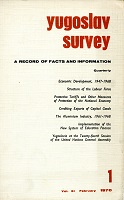
In recent years relations between Yugoslavia and France have taken a favorable course. In 1966—1969, there were many exchanges of visits, numerous agreements relating to various spheres were concluded, good results were achieved in economic, scientific and cultural cooperation, and there were mutual visits by socio-political, professional and other delegations.
More...
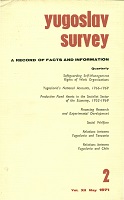
First contacts between Yugoslavia and Tanzania were established when. Tanganyika and Zanzibar were still under British colonial rule. The Government and the peoples of Yugoslavia gave full political, moral and material support to the liberation struggle of the peoples of these countries. At the invitation of the self-government of the trusteeship territory of Tanzania a Yugoslav government delegation headed by Krsto Popivoda, Member of the Federal Executive Council, attended the formal proclamation of Tanganyika’s independence on December 9, 1961. At that time diplomatic relations were established between the two countries at ambassadorial level. The Yugoslav Government immediately opened an. embassy at Dar es Salaam and accredited its ambassador to Tanganyika.
More...
Good and friendly relations between Yugoslavia and Chile are characterized by cordiality, mutual respect, consultations regarding international issues, and efforts to expend bilateral relations. These relations have been developing successfully despite the great geographical distance and differences in the social-economic systems of the two countries. This favorable development of relations between the two countries is the result of several objective factors, particularly their vital interest in preserving peace in the world, and their adherence to the principles of the United Nations Charter, primarily respect for the principle of full independence and sovereignty of States. Both being developing countries, and having therefore similar problems and needs, Chile and Yugoslavia strive to know each other better and make joint efforts to find ways and means of overcoming obstacles hindering their accelerated development. In addition, the Yugoslav ćmigrć colony in Chile is a significant factor which contributes to the cultivation and promotion of good relations between the two countries.
More...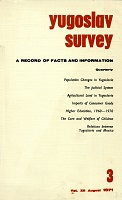
Since the establishment of diplomatic relations between Yugoslavia and the Kingdom of Afghanistan notable results have been achieved in cooperation between the two countries, especially in the political field. Cooperation has developed through relatively frequent contacts and meetings between statesmen of the two countries, both through bilateral contacts and through various international actions and gatherings, at which identity of view on the most important world problems has been noted. This has particularly come to expression in the United Nations and at the meetings of the non-aligned countries in which Afghanistan has regularly taken part.
More...
In the period 1965—1970, relations between Yugoslavia and Iran were marked by similar or identical views on many international issues and the wish to promote mutual cooperations.
More...
Relations between Yugoslavia and Mexico have been traditionally good and friendly. There have first of all been numerous exchanges of views on major international issues, especially within the framework of the United Nations, such as the preservation of peace, the problems of underdeveloped countries, standpoints on closed economic groupings, the limits of territorial waters, the condification of the principles of coexistence, disarmament, and other current international events. Furthermore, in recent years both countries have shown increasing interest in expanding bilateral cooperation in the economic, scientific and cultural spheres. Special efforts have been made to increase trade and promote economic cooperation which lags behind the level of cooperation attained in the political, cultural and other fields.
More...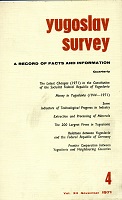
“At the invitation of the President of the United States of America, Richard Nixon, the President of the Socialist Federal Republic of Yugoslavia, Josip Broz Tito, accompanied by Mrs. Broz and their party, is paying a State visit to the United States. Following their Washington stay from October 28 to October 30, 1971, President Tito and Mrs. Broz and their party are to visit several points of interest in other parts of the country, remaining in the United States until November 2, 1971.
More...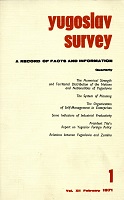
The twenty-fifth session of the United Nations General Assembly was held in New York from September 15 to December 16, 1970.1 The session had a jubilee character because it was partly a celebration of the 25th anniversary of the United Nations. There were 102 items on the agenda which were discussed either in Plenum or in one of the seven main Committees of the Assembly. Twenty heads of state, 2 vice-presidents of republics, 24 premiers, two vice-premiers* 81 foreign ministers, and 13 cabinet ministers took part in the various stages of the session.
More...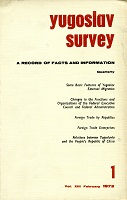
At the invitation of the President of the United Arab Republic, Anwar El Sadat, President Tito paid an official visit to the United Arab Republic from raFebruary 14—20, 1971. A joint communique was issued at the end the visit.
More...
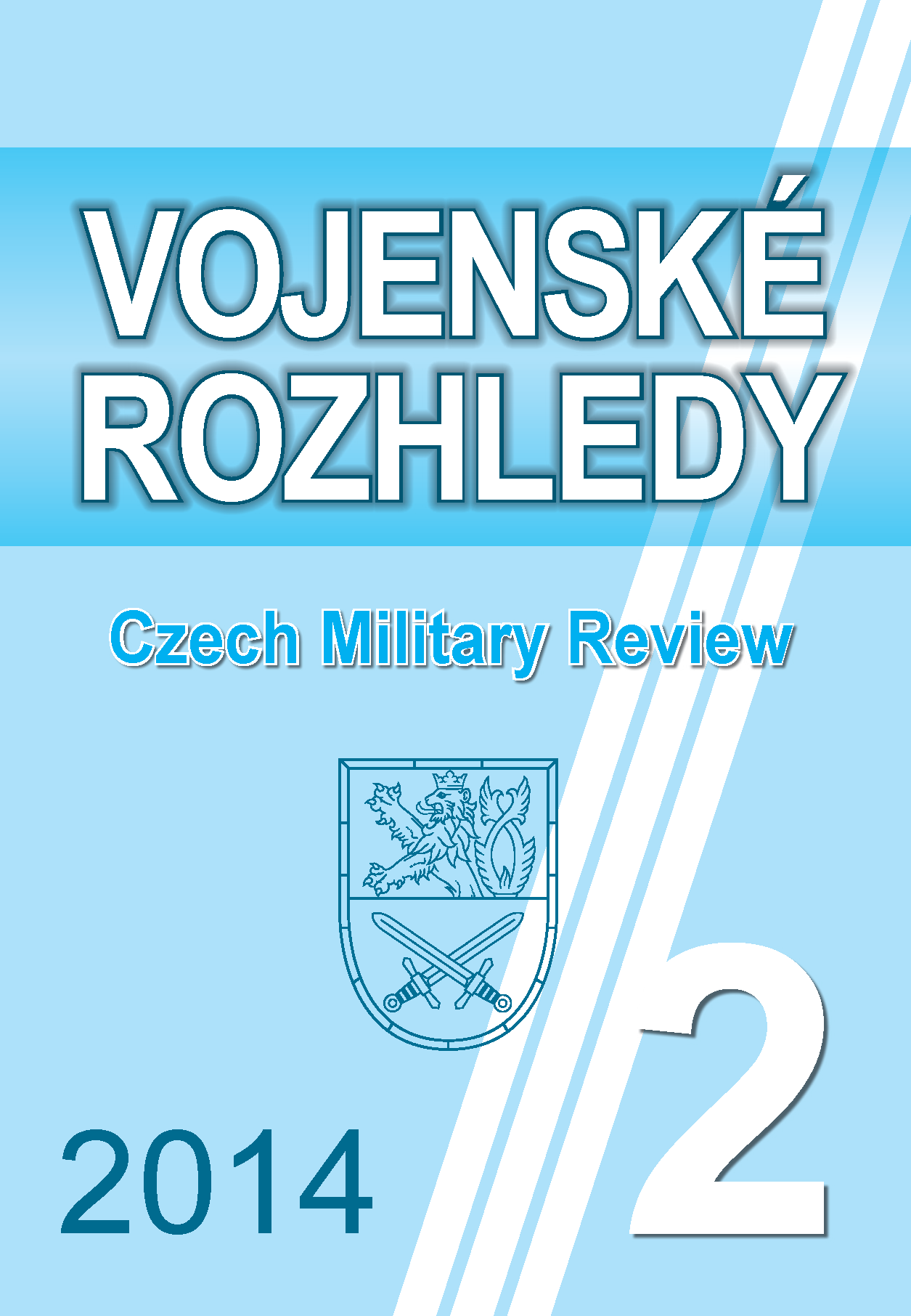
The life and work of General Dr. Milan Rastislav Štefánik is without doubts the life and work of one of the three leading crisis managers of extraordinary skills operating in an environment of first escalating global crisis of the 20th century. The phenomenal result of their activivities was the establishment of the Czechoslovak Republic. The author concludes that Štefánik’s work is timeless, from which we ought to draw a continual inspiration.
More...
During the Second World War, the Italian envoy in Belgrade had no authority to communicate directly with local administrations. However, the reports of Italian diplomats on the situation in occupied Serbia cast a different light and give a more detailed picture of the many events and processes. They were based on personal insight, interviews with the official representatives of Germany in Serbia, and also on indirect contacts with Serbian officials in the administration under occupation. Those contacts were maintained through trusted mediators. During the two first war years, Italian diplomats daily followed the situation in the country and in the city, the functioning of the German military command, and important leaders including General Milan Nedić, General Dragoljub Draža Mihailović, Kosta Pećanac, and Dimitrije Ljotić, as well as their asociates. The man behind most of the reports was experienced diplomat Francesco Mameli. the Italian envoy in Belgrade from 1940 to 1943. Of particular importance are testimonies gained through direct contacts with representatives of the Serbian occupation apparatus. They reveal many hidden details of a turbulent and complex period in Yugoslav history, including the negotiations between Italian Legation personnel and General Milan Nedić during the spring of 1942.
More...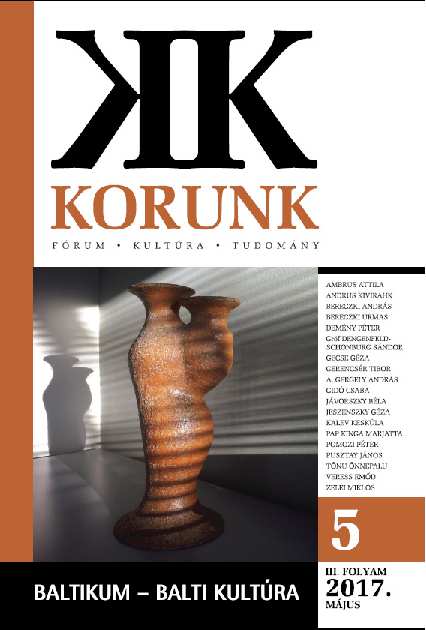
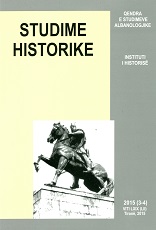
Peace Conference in Paris, organized after the First World War by the victorious powers, France, Britain, the United States and Japan, among others, addressed the issues of borders and the status of the Balkan states and within them the "Albanian issue". Although neutral in the global conflict, Albania risked to be annihilated.Albanian official delegation of the interim government of Dürres, who went to Paris, soon was convinced that not only the correction of past injustices against Albania was not happening, but the new danger was threatening to fatal. Drawing position and omissions didn’t bring any benefit. To the great powers, particularly France and Britain, Albania was the country to be sacrificed again in order to normalize the situation in the region.Accord or compromise of 13-14 January 1920 was the worst aspect. France, UK and Italy, in the absence of the representative of the US, adopted a resolution that was opposed not only by the US but also Yugoslavia. Right from this moment, the developments in the Albanian territory, diplomatic and popular movement, took an interesting direction. Therefore, there is space for the historiography to deepen its overview. This article aims to enlighten a period of several weeks after the 14 January compromise that significantly increased the role of the Albanian factor in making decisions for the future of Albania.On March 6, the US president gave a definitive answer to "The Adriatic Case."By supporting the proposal for direct talks between Italy and Yugoslav, in order to flush the contradictions between them, the head of the White House stressed that the Albanian issue "should not enter into the discussion proposed between Italy and Yugoslavia" and that he "will not approve any plan that would give Yugoslavia a territorial compensation in the northern part of Albania, for what may rip off somewhere else ".US president's determination forced European allies to withdraw and came to help to both Yugoslavia and Albania. Yugoslavia had now the opportunity to negotiate directly with Italy, as for Albania the risk of division was postponed and Albanians gained a lot of valuable time which they knew how to exploit.
More...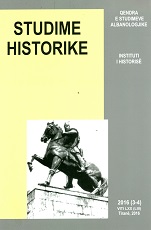
Historikisht, raportet armiqësore midis iliro-arbërve dhe serbëve (më pas shqiptarëve) zënë fill nga shek. VII e në vijim, kur trevat e të parëve u sulmuan, u grabitën u pushtuan, robëruan dhe u sunduan prej të dytëve për shumë shekuj. I rëndë qe veçanërisht sundimi gati 150-vjeçar në shek. x n -x m , që kulmoi me Carin e Madh Stefan Dushanin, në mesin e shek.Xm. Armiqësia do të rigjallërohej pas rënies së Ballkanit nën sundimin e Perandorisë Osmane, veçanërisht kur ndodhi konvertimi i shqiptarëve në Islam, masivisht pas shek. XVII dhe kur u forcuan nacionalizmat ndërballkanikë në shek.XIX. Ndërkohë projektet e konfrontimit etnik dhe fetar, shkëputja dhe aneksimi nga Serbia i viseve shqiptare, posaçërisht nga viti 1878 dhe spastrimi etnik i sanxhakut të Nishit në vitet 1877-1878 (100 - 200 mijë shqiptarë), i acaruan më tej marrëdhëniet shqiptaro - serbe. Konfrontimi me serbët i muhaxhirëve shqiptarë në Kosovë e më gjerë, por edhe i çerkezëve etj., të dëbuar pas Luftës së Krimesë më 1855-1856, ishin pasoja të acarimit më tej të raportit serbo-shqiptar. Gjithsesi kulmi i përplasjes midis të dy palëve do të vinte në rrjedhën e Luftës Ballkanike e më pas (vjeshtë 1912- deri në vitin 1915).
More...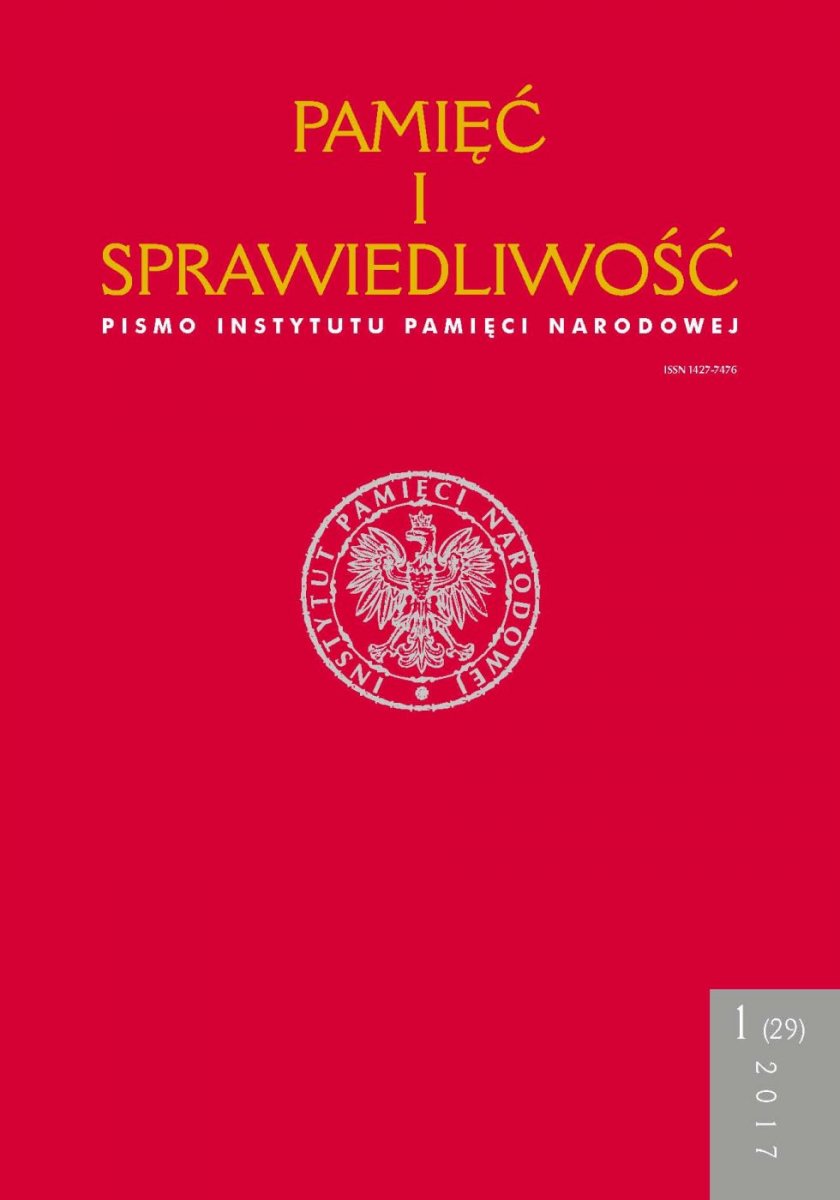
Rok 1963 w stosunkach polsko-brytyjskich rozpoczął się dobrze z punktu widzenia władz PRL. Stało się tak za sprawą sprzeciwu, który prezydent Francji, gen. Charles de Gaulle, ogłosił 14 stycznia wobec starań Wielkiej Brytanii o członkostwo we Wspólnotach Europejskich. Perspektywa ich wzmocnienia mocno niepokoiła I sekretarza Komitetu Centralnego Polskiej Zjednoczonej Partii Robotniczej (KC PZPR) Władysława Gomułkę. Obawiał się on także ograniczenia wielkości polskiego eksportu do Wielkiej Brytanii w konsekwencji jej przystąpienia do Wspólnot. Utrudniłoby to zakupy urzą- dzeń przemysłowych w tym państwie, z którym PRL, jako jednym z nielicznych wysoko rozwiniętych krajów zachodnich, miała nadwyżkę handlową
More...